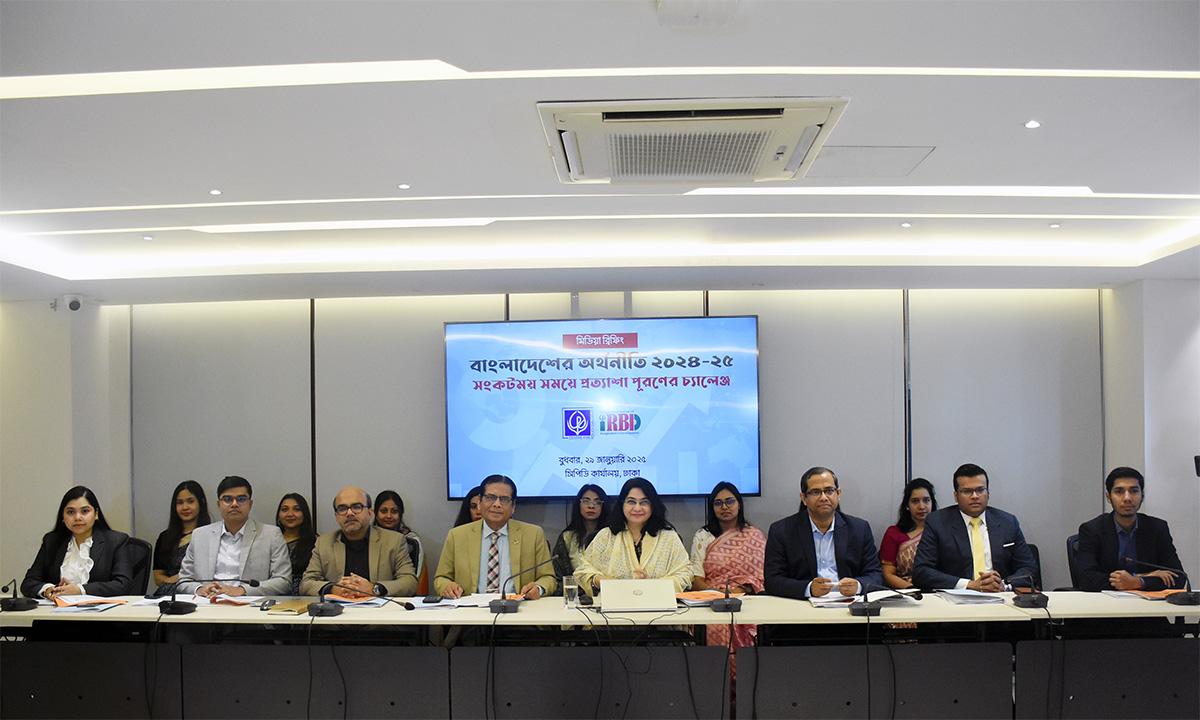
Download: Presentation Policy Brief Paper
Recent analysis of the state of the Bangladesh economy by the Centre for Policy Dialogue (CPD) has shed light on the prevailing fiscal challenges in Bangladesh, revealing a marginal increase of 3.7 per cent in revenue collections during the initial months of FY2025 and an alarming dependence on high-cost domestic borrowing to finance the national budget deficit. The findings further highlight a necessary 45.1 per cent growth required in the latter half of the fiscal year to meet annual targets, casting doubt on the feasibility of achieving these goals under current economic strategies. Additionally, an uptick in non-Annual Development Programme (ADP) expenditure driven largely by domestic interest payments suggests a tightening fiscal space that may hinder sustainable economic growth.
These findings were discussed in detail at a media briefing titled ‘Bangladesh Economy 2024-25: The Challenge of Meeting Expectations in Troubled Times’ held on 29 January 2025, where Dr Fahmida Khatun, Executive Director of CPD, provided a comprehensive overview of the economic landscape through a keynote presentation.
Dr Khatun offered several recommendations aimed at rectifying fiscal imbalances and catalysing economic recovery. She highlighted the critical need for the interim government to prioritise the prevention of tax evasion and to enhance tax compliance mechanisms to ensure a more robust fiscal framework. Specific attention was called to the need for a strategic focus on completing near-term ADP projects, particularly those over 85 per cent completion, which can quickly stabilise the economy by attracting private investment and generating employment.
On addressing supply chain inefficiencies that exacerbate inflation, Dr Khatun recommended measures to directly connect farmers to the market, thereby reducing the influence of intermediaries. This approach would help in regulating market practices such as hoarding and stockpiling by major players in the agricultural supply chain. Furthermore, she emphasised the importance of improving storage and transportation infrastructures to reduce post-harvest losses, which would contribute to stabilising food prices and reducing inflationary pressures.
For the external sector, Dr Khatun suggested enhancing export competitiveness and decreasing import dependency as strategic imperatives to mitigate the adverse effects of global market fluctuations on the economy. In case of private investment, she called for streamlined procedures and incentivisation policies to rejuvenate the sector, which is crucial for sustainable economic growth.
Dr Khatun also touched upon the need for comprehensive reforms in the energy sector to address the ongoing crisis characterised by a vicious cycle of debt. She recommended diversifying energy sources and reforming the sector’s financial management to ensure its sustainability. Similarly, in the banking sector, she advocated for significant governance improvements to restore confidence among investors and the general public.
In her concluding remarks, Dr Khatun stressed the urgency for the interim government to adopt a transparent and inclusive approach in its reform initiatives. She underscored the importance of implementing targeted reforms that cater specifically to the sectors most impacted by economic challenges, ensuring the groundwork for a stable and prosperous economic future.
Professor Mustafizur Rahman, Distinguished Fellow, CPD, noted that the think tank has long advocated for an increase in the tax-to-GDP ratio. He emphasised that the country’s growing reliance on debt to finance development activities stems from this persistently low ratio.
However, he cautioned that boosting tax revenue primarily through higher value-added tax (VAT) could exacerbate the burden on people already grappling with high inflation.
An open-floor Q&A session with journalists from both print and electronic media followed the discussion.


